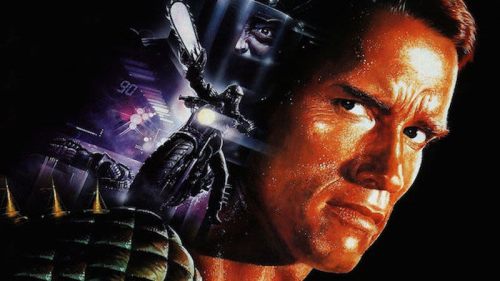Thank You, Chuck Norris
He steps off the plane, clad in aviator sunglasses and an offbeat burgundy shirt. He’s a stranger in a strange land, ready to decimate any and all who stand in his way. “Who can do karate better than Japanese?” an offended underworld proprietor shouts at the sandy blonde-haired white man. With a few brutal punches and a swift kick in the face, the interloper shows the petty underling who’s boss, stopping short at his sponsor’s command and demonstrating he can take orders just as well as he can whoop ass.
Chuck Norris’ entrance in the legendary Bruce Lee film, The Way of the Dragon, is a thing of pure awesomeness. All swagger and cocksure ability, he’s the perfect silent foil to Lee’s coiled, sinewy superhuman. Worlds removed from his meager beginnings as a working class kid from Ryan, Oklahoma (who relocated with his mother and two younger brothers to Torrance, California when he was twelve), Norris studied Tang Soo Do while stationed in Korea with the Air Force. By 1966, he was winning National Karate Championship belts seemingly at will, before retiring in 1974 with a superlative record of 65-5. In the meantime, he moonlighted as an instructor, helping to manage multiple martial arts schools. Amongst his students was the one and only Steve McQueen, who urged the fighter to take up acting lessons and pursue a Hollywood career.
Over the next twenty years, Norris would cultivate a B-Movie leading man image all his own: one part All American hero, another part exploitation God, never above becoming a marquee idol for Menahem Golan and Yoram Globus’ infamous Cannon Films. At Cannon, Norris was able to carve out a niche all his own, acting as a white-bread avatar for the conservative values he would (following a retirement from acting) become a quite literal mouthpiece for (his regular columns on right-wing sites like Town Hall paint him as a bible-thumping nightmare person). But this was what made his movies so endlessly fascinating – the dissonant conflict of grime and True Blue ‘Merica that was never graceful, but often made for enthralling case studies regarding medium versus message. Norris was delivering his own brand of subversion – triggering audiences who probably shouldn’t be rooting for a Republican dispatch to hoot and holler inside of a dive theater. In an arena usually known for anti-establishment bull-horning, Norris often caused Times Square crowds to cheer on The Man. That’s fucking strange.
Now this doesn’t need to be a pissing contest, but I’m going to turn it into one. Chuck Norris is my favorite “action star” ever (who doesn’t own the last name Statham). Where Steven Seagal stopped being interesting somewhere around On Deadly Ground, and Jean-Claude Van Damme continues to churn out DTV work that is just as hit and miss as when his movies actually made their way into theaters, Norris’ filmography remains a diverse listing of exploitation eccentricity. It’s somewhat sad, following his online memeification (ugh, those “Fact” jokes are the worst), that the star’s brand of bizarre action movies have lost a bit of their luster with modern viewers. Because his output, no matter how corny or “dad rock” it is, still stands as a genuine anomaly in the genre game. So I choose to give thanks and crafted a “starter kit” list for the roundhouse master’s goofy body of work.
Good Guys Wear Black [1978] (d. Ted Post, w. Bruce Cohn & Mark Medoff)
There’s a solid sum of wish fulfillment in Chuck Norris’ movies, but none of his dreams seem to run as deep as his want for erasure of the Vietnam War. In his autobiography, Against All Odds, Norris writes that he made Missing in Action because his younger brother, Wieland, was killed in 1970 during the conflict. However, Good Guys Wear Black is his first film that addresses the confusion and distrust of government Vietnam initially instilled in the action star. In it, John T. Booker is an ex-commando, unsure why his legion of operatives (Code Name: Black Tigers) is being executed by their own administration, following several covert ops in the jungle. Though Norris’ later work would reflect his evolving conservative political views, Good Guys Wear Black feels somewhat radical, if overtly chintzy in execution. None of the fights are overly thrilling, as director Ted Post (Beneath the Planet of the Apes, Magnum Force) never proves himself a competent action director. Yet what the filmmaker lacks in elegantly choreographed staging, he more than makes up for in B-Movie attitude. Good Guys Wear Black is an abnormality in the Norris filmography because it wears its “establishment done me wrong” outlook on its sleeve. As time wore on, Norris would eventually find himself an avatar for the Good Ol’ US of A, but that doesn’t mean he wasn’t above questioning the patriotism of its shadiest operatives during his younger years.
Silent Rage [1982] (d. Michael Miller, w. Joseph Fraley)
A springboard for the horror/action hybrids that would comprise a portion of Norris’ career, Silent Rage is fittingly outlandish, just sleazy enough, but never tips over into full-blown exploitation like his later work (see: Hero and the Terror, which unfortunately sucks). Michael Miller’s movie follows a fairly nonsensical story pattern, but is peppered with a stellar cast of character actors (Bill Finley, Ron Silver, Flounder from Animal House); all of whom add a great deal of personality to the proceedings. The balance between Norris’ wholesome, cowboy image and the grimier genre constructs that catered to his unique skill set as a martial artist is being solidified, complete with an utterly ludicrous sex montage (a Chuck staple) that involves a wildly swinging rope hammock. Like the best rough and tumble actors, Norris wasn’t afraid to mix his genre flavors together, resulting in this truly bonkers, breakneck-paced horror picture.
Code of Silence [1985] (d. Andrew Davis, w. Michael Butler, Dennis Shryack & Mike Gray)
Call it Chuck Norris’ Robocop, this team up with Chicago director Andrew Davis (who would eventually go on to helm both The Fugitive and Under Siege) finds the karate killer taking off his black belt and picking up a shotgun, as he battles police corruption and the preposterously named gang, The Camachos (led by leather-faced hate machine, Henry Silva). Meanwhile, the police are rolling out a new replacement officer (labeled The Prowler) that sort of resembles Johnny Five from Short Circuit, only it’ll slaughter the shit out of an East Side crime headquarters without batting a mechanical eyelid. These disparate pieces don’t precisely match up (and apparently were originally intended for use in a fourth, pre-Sudden Impact Harry Callahan picture), as the cartoonishness of the Prowler side plot is tonally discordant when played against the self-serious police drama Norris’ Eddie Cusack finds himself embroiled in. But that doesn’t mean both of these dishes aren’t delicious when eaten side-by-side, as Chuck is actually asked to act (woodenly, of course) and delivers a gruff, no-nonsense portrayal of a man who finds his peers (played by former Windy City cops like Dennis Farina) turning their backs on him when he speaks up regarding dishonesty. Code of Silence is also notable for being a primary pivot in Norris’ filmography, as he moves away from his Hall & Oates boyishness and embraces the full-blown Bob Seger “dad rock” look that would define his later (and, to be honest, best) years.
Invasion U.S.A. [1985] (d. Joe Zito, w. James Bruner & Chuck Norris)
The ultimate Chuck Norris movie, and one of the great action pictures from any era, period. This right-wing Republican nightmare is nirvana for any good ol’ boy that stocks guns in their bunker, just waiting for the Commies to come knocking on their door. As Soviet operative Mikhail Rostov (Richard Lynch, whose favorite method of execution is to literally shoot dudes’ dicks off) leads a legion of Cuban militants in an attempt to simply lay waste to Suburban USA, Norris’ former CIA operative, Matt Hunter, is rousted out of retirement from the Everglades (via a failed assassination attempt that leaves his modest cabin destroyed), where he apparently has been spending his free time wrestling alligators. Absolute lunacy ensues, as Hunter marches back and takes on an entire army, wielding dual Uzis and sporting a Levi’s section worth of denim. Director Joe Zito (the Friday the 13th: Final Chapter helmer who helped kick off Norris’ Cannon run with Missing in Action) goes full-tilt, embracing utter irrationality and just running with it toward a finish line that involves tanks, a rocket launcher, and more great one liners than most action stars deliver during their entire body of work. Bonus points for having a hero that is so deadly, our main bad guy wakes up in a cold sweat, his nightmares of Matt Hunter letting him know that there’s no way he’s going to beat down America’s doorstep without getting punched in the fucking face.
The Hitman [1991] (d. Aaron Norris, w. Robert Geoffrion, Don Carmody & Galen Thompson)
Were one to base their understanding of Seattle on this one movie, they would ultimately perceive the city as an utter wasteland of dueling gangs. La Cosa Nostra, Franch Canadian criminals, Iranian drug lords; all of these elements come together to form a perfect storm of unlawful activity. At the center of it all is Grogan (Norris), a deep cover cop whose own department passed him off as dead after being shot down by his corrupt partner (Michael Parks) in the line of duty. Truly one of the best examples of Cannon’s “we made this shit up as we went along” style of filmmaking, Grogan’s story doesn’t make a lick of sense, but that doesn’t keep it from being endlessly entertaining, as his above the law status gives him a license to kill that his Captain simply spits and curses at him to stop utilizing at will. Along the way, Norris pauses the incessant bloodshed in order to tutor a young black boy (Salim Grant) who is getting picked on by the viciously racist fat kid across the street, thus keeping his oddly wholesome image intact (though this is slightly undercut when he enters an Iranian bar and starts tossing the term “raghead” around). Filled with enough incredible stunt work and viciousness to keep trash action heads grinning, The Hitman is the best of Norris’ later R-rated output he would abandon in order to return to Cordell Walker’s Texas Ranger fame for the majority of his final acting run. Vaya con Dios, Carlos - we should all be thankful for the batshit garbage cinema your time onscreen bestowed upon us.



